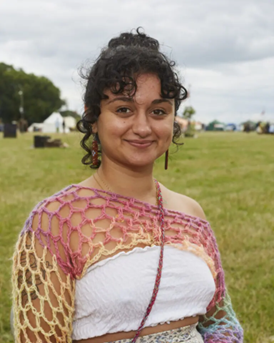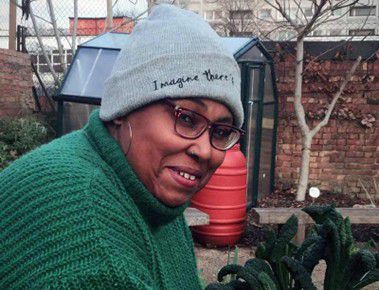Blog
Explore project findings through mixed media reflections on key themes and issues.
Ecofeminist activism – care at the heart of the movement
Posted on behalf of: Dr Rachael Durrant
Last updated: Wednesday, 4 June 2025

Image credit: Rachael Durrant
The Landworkers Alliance (LWA) is the UK arm of the global peasant movement for food sovereignty and agroecology, La Via Campesina. It is also an outspokenly feminist organisation that champions principles of care and reciprocity.
Compared to the UK population at large, women are substantially overrepresented within both the membership and staff body of the LWA. With almost 60% of recent joiners identifying as female, and a further 6% identifying as gender non-binary, this gives the LWA a very different feel to most other land-based organisations in the UK.
But can the women in the Landworkers Alliance, and others involved with land-based social movements in the UK, provide the unique and valuable perspectives on how to live in harmony with nature that ecofeminist theory suggests they might?
The extent to which the LWA represents women of different intersectional identities – e.g., young, black, migrant, working-class, gender-queer, neuro-diverse, and disabled women – is an important question to consider.
Women, diversity and inclusion in the Landworkers Alliance
As mentioned in an earlier post, the LWA supports a number of identity-based groups for members who are marginalised in landwork and wider society. But outside of these groups, the staff and membership are perceived by some of the women that I interviewed as being dominated by white, middle-class women.
This is relevant because, as emphasised in the previous post on ecofeminist theory, not all women experience equal levels of unequal treatment. Moreover, the position of white middle-class women in relation to wider feminist struggles is complicated – no more so than when their experiences and views are taken to stand for the experiences and views of all women, or consistently attended to at the expense of other women gaining recognition and being heard.
But despite the alleged white, middle-class majority, the LWA staff team are working to support multiply marginalised communities, celebrate diversity, and strive towards inclusion. There are many individuals involved in this work, but I want to spotlight the efforts of two in particular.
 New entrant landworker and former member of the LWA Coordinating Group, Jo Kamal (pictured), for instance, has worked across the LWA’s campaigns and movement-building teams to “strengthen the UK food sovereignty movement and embed intersectionality and political liberation within it”.
New entrant landworker and former member of the LWA Coordinating Group, Jo Kamal (pictured), for instance, has worked across the LWA’s campaigns and movement-building teams to “strengthen the UK food sovereignty movement and embed intersectionality and political liberation within it”.
Left: Jo Kamal © Louis Little for the Gaia Foundation, We Feed the UK, 2023
During a panel discussion at the LWA’s festival of food, land and climate justice, the Land Skills Fair, in 2023, Kamal argued that focusing on productivity and profit can leave no time for land care. According to Kamal, cultivating care for ourselves and others is a radical act of resistance to these cornerstones of capitalism and colonialism.
The LWA’s Food Justice Policy Coordinator, Dee Woods (pictured), describes herself as “a food and farming action-ist who advocates for good food for all and a just, equitable food system, challenging the systemic barriers that impact marginalised communities and food producers”.
 During her time working for the LWA, Dee has engaged in negotiations in Rome to help develop guidelines on gender equality for the United Nations Committee on Food Security. Dee is also a co-founder of the Granville Community Kitchen cooperative in Kilburn.
During her time working for the LWA, Dee has engaged in negotiations in Rome to help develop guidelines on gender equality for the United Nations Committee on Food Security. Dee is also a co-founder of the Granville Community Kitchen cooperative in Kilburn.
Right: Deirdre (Dee) Woods, member of the Landworkers' Alliance (LWA) Coordinating Group. Image credit: Granville Community Kitchen (GCK).
Women at the Oxford Real Farming Conference
What’s more, women from a range of ethnicities and cultural backgrounds, including LWA staff, members and organisers, have taken leading roles at the Oxford Real Farming Conference (ORFC) in recent years. From delivering keynote speeches, to chairing sessions and appearing on panels throughout the conference, women landworkers and activists have presented a wealth of experience from agroecological farms, community food projects, and a host of other food and land-based enterprises.
As an in-person attendee, I was able to be in a small subset of the many and varied sessions over the past four years. Some of the sessions that have most profoundly affected my thinking about feminism and diversity in the movement include the following (with links to watch them on the ORFC's YouTube channel/via the ORFC):
- Addressing barriers to BPOC farming (ORFC 2022)
- Agroecology and Feminism (ORFC 2023)
- Land as Reparations and how to get there (ORFC 2024)
- From Ubuntu to Kapwa (ORFC 2025)
One session in particular, the session on ‘Agroecology and Feminism’ at ORFC 2023, shed some light on the questions that I raised at the top of this post – i.e., about whether women in the movement can provide a unique perspective on food system sustainability challenges.
Agroecology and Feminism
This session was chaired by the LWA's Clem Sandison and featured a panel of women and non-binary landworkers including Lyn Cassells, Bridget Murphy, Sasha Georgiades, and Sandra Salazar, as well as veteran feminist activist Selma James. I found this panel session completely absorbing and was swept away by the mix of moving personal stories (from the four landworkers) and well-honed political conviction (from the unforgettable Selma James).
In terms of the issues and ideas that were spotlighted, the session went a long way towards centring experiences ‘from the margins’. The four landworker-panellists’ journeys into agroecological farming were diverse in details, but shared a strong sense of struggle for space within oppressive systems. This varied field of experience was juxtaposed against Selma James’s incisive viewpoint on the need for a wide-ranging political and economic revaluing of care, via the establishment of a ‘care income’.
“Taking care of people and taking care of the soil and the natural world constitutes one essential job.”
Selma James, panellist, and coordinator of the Global Women’s Strike, as quoted by ORFC 2023 facilitators Lucy Harding, Dora Taylor, and Hester van Hensbergen in an article for 'The Feminist Food Journal'.
Ecofeminist activism in an unequal society
Reflecting on all these sessions, some speculative answers to my pressing questions are occurring to me. Agroecology and other land-based movements in contemporary Britain reflect the wider society of which they are a part. They are varied terrains, encompassing a diversity of experience. However, they do not exist in isolation from the oppressive values that they set out to critique. Layers of privilege and exclusion cut across the movement, creating pockets of similarity and difference; ease and discomfort; ignorance and awareness.
As a predominantly white, middle-class movement, there are undoubtedly parts of the wider problem that will be out of reach. There will be people and places that have little to gain from its existence. There may also be individuals and communities that are harmed by it. But for a growing number of women and people of other diverse and marginalised genders, organisations such as the LWA, and events such as the ORFC, are providing spaces within which vulnerable conversations about critical (but neglected) issues and questions can be worked through. So, as is often said in Spanish about La Via Campesina, ‘long live the LWA!’ and, ‘long live the ORFC!’
Resources
Josina Calliste, Sam Sivapragasam and Marcus Mcdonald (2021) Rootz Into Food Growing: knowledge and experiences of social enterprise food growers from black / communities of colour. Land In Our Names.
Lucy Harding, Dora Taylor, and Hester van Hensbergen (2023) “Envisioning Feminist Food Futures Through Agroecology: Reflecting on care, justice, and relationality at ORFC 2023”, Feminist Food Journal, Issue #04 – Earth.